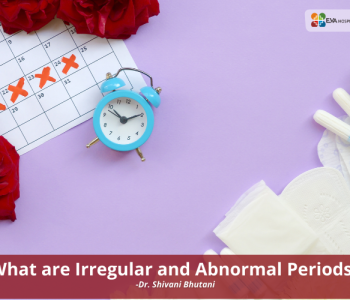 Eva Hospital
Eva Hospital
What are Irregular and Abnormal Periods?
Irregular and Abnormal Periods
Regular Periods are often a sign of a woman’s good health and vitality. However, very often women have to face the challenge of Irregular or Abnormal periods. Irregular and Abnormal periods refer to a condition wherein the length of your menstrual cycle varies each month.
Since the average menstrual cycle is about 28 days, any significant variation from this number can be considered as Irregular or Abnormal Periods. It also signals too heavy or little bleeding during the given menstrual cycle.
Amenorrhea refers to the condition wherein a woman doesn’t have a period for at least three menstrual cycles.
Oligomenorrhea occurs when the periods are more than 35 days apart and Menorrhagia is the condition of heavy bleeding that lasts more than a week.
All these are instances of Irregular or Abnormal Periods.
Causes and Symptoms
Some of the different possible causes of Irregular periods include Puberty, extreme weight loss/gain, emotional stress, hormonal imbalances, early pregnancy, change in contraception method, high training exercises, or sometimes medical conditions like How to cure PCOS permanently, eating disorders, and Thyroid.
Also Read: PCOS – Understanding and Demystifying the Phenomenon
Hormonal Imbalance is one of the major culprits in irregular menstruation; Estrogen and Progesterone being the two regulating hormones of the menstrual cycle.
When either of these hormones is imbalanced, the result is Irregular Periods.
Generally, most women’s cycle becomes regular after Puberty but for some, the time between the periods varies considerably and this is called irregular menstruation.
It can indicate problems like PCOS- a woman with this condition does not ovulate/ release an egg every month; which can cause fertility issues. Yet another condition called Endometriosis can also cause irregular menstruation.
In An Endometriosis specialist near me, the inside tissue lining begins to grow elsewhere inside the body and can cause heavy bleeding and pain. Further, being Overweight also adds to the risk of menstrual irregularity.
Sudden weight gain and Irregular Periods happen to be the common symptoms of PCOS and Hypothyroidism; and therefore, need to be timely evaluated by a doctor.
Similarly, extreme weight loss and eating disorders can also contribute to Abnormal periods. Excessive stress, as well as extreme exercises, can also play havoc with your menstrual cycle.
When to consult your Doctor?
Dr. Shivani Bhutani from EVA hospital suggests that Irregular Periods/abnormal uterine bleeding may not always be a cause of alarm during Puberty or Menopause, but it is always advisable to check in with your doctor if the condition persists, especially during the reproductive years and you notice the following:
- Sudden changes to the length and duration of your Periods
- Abnormal/ heavy bleeding
- No Periods for 3 months
- Your periods last more than a week
- Your Periods are extremely painful or heavy
- Bleeding in between Periods
- Period more often than every 21 days
- Periods less often than every 35 days
Your doctor will advise you on medication or Hormone therapy or lifestyle changes based on your unique personal case.
Once you are in the safe hands of the doctor, you will realize that even though Irregular periods can be stressful, they can be regularized and treated well on time.
The only thing you need to do on your part is to be constantly aware of your menstrual cycle patterns and seek timely help.